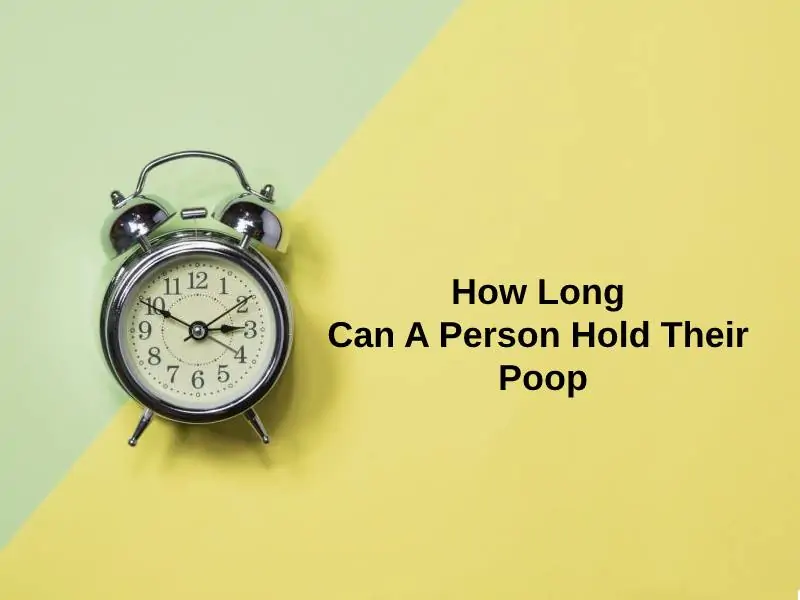Exact Answer: indefinitely until medical problems arise
Research suggests that an average person with no serious medical problems and a life expectancy of around 79 years will spend 240 days out of that time pooping. That is broken down into an average of 12 minutes spent pooping every day. Usually, you would not give much thought to the process of pooping, or the time spent on it. But it becomes a problem when you have not pooped in days or even weeks. It certainly became a problem for a 16-year-old from the UK who died of a heart attack caused by 8 weeks of no pooping.

How Long Can A Person Hold Their Poop?
| Frequency of pooping | Constipation |
| 1-3 times/day (or every other day) | No |
| <2 times a week | Yes |
Doctors agree that a ‘normal’ frequency of pooping would be 1-3 times each day or every alternate day. Our bodies naturally form pooping schedules that we don’t even notice we are adhering to. Much of our pooping tendencies rely on the kind of food we eat, the amount of exercise we get, and the type of lifestyle we are engaged in (stress-free or not). They may be affected by any allergies we develop (for example lactose intolerance) and any medical conditions we may suffer from.
Constipation occurs when a person has pooped fewer than 2 times in a week. It may be accompanied by bloating and stomach pain. As such, it is important to promptly treat constipation when it occurs. Technically, you can go an indefinite time without pooping – but this would give rise to all sorts of medical problems.
Some common causes of constipation are:
- Lack of fiber in diet – eating highly processed and fatty foods, including a lot of dairy in meals
- Lack of exercise – living a sedentary lifestyle, not enough mobility
- Lack of hydration – an important cause, not drinking enough water regularly
If you recognize any of the above apply to your life, then consider changing your habits to avoid the development of any serious issues.
Some common symptoms of constipation are:
- Difficulty in passing poop
- Lumpy, dry, or hard poop
- Stomach or abdominal cramps
- Nausea
- Loss of appetite
If you experience the above symptoms, consult your doctor, who may prescribe mild laxatives to help you pass poop.
Why Can A Person Hold Their Poop For That Long?
One cause of holding in poop can be anxiety over using the toilet in unfamiliar places or situations. This is also seen in toddlers, who when negatively responding to toilet training may refuse to poop. Due to constipation, they may also develop an association of pain with pooping – making them afraid to poop. They might make it a habit not to poop when their body indicates the need for it. Fortunately, as such children turn into teenagers and adults, most of them grow out of these habits.
Some people may however suffer from anxiety disorders and prefer to poop in the comfort and familiarity of their own home. They would hold in their poop any time they are out of the house. Such habits may cause anal muscles to become less responsive and rectal nerves to swell, causing irritation, bleeding, and the presence of mucus in the anus.
Constipation without treatment for too long may lead to fecal impaction. This is a condition where pieces of poop turn hard as water is absorbed into the intestine, leading to even more difficulty in passing it. If left unchecked, medical procedures may be required to remove the feces from your body. Another consequence of constipation may be bowel perforation. This happens when the excess stool backed up in the intestines puts too much pressure on them, tearing the wall and spilling the poop into the abdominal cavity. Since poop is acidic and contains bacteria, this condition may be life-threatening.
Therefore it is extremely important to get constipation treated in time. Long-term constipation may also threaten your cardiovascular health, like in the case of the aforementioned teenager.
Conclusion
Laxatives like fiber supplements, stimulants, lubricants, stool softeners, cosmetics, etc are enough to treat constipation the majority of the time. Some of these are available over the counter while others may require a prescription. If you remain constipated despite all measures, the doctor may have to remove the poop manually or prescribe surgery. In case of psychological causes for holding back poop, the physician may prescribe treatment or therapy accordingly.
To keep your body functioning well, it is thus essential that you keep track of your pooping habits to know when something is amiss. A healthy, active lifestyle goes a long way in preventing most bodily problems, including constipation.